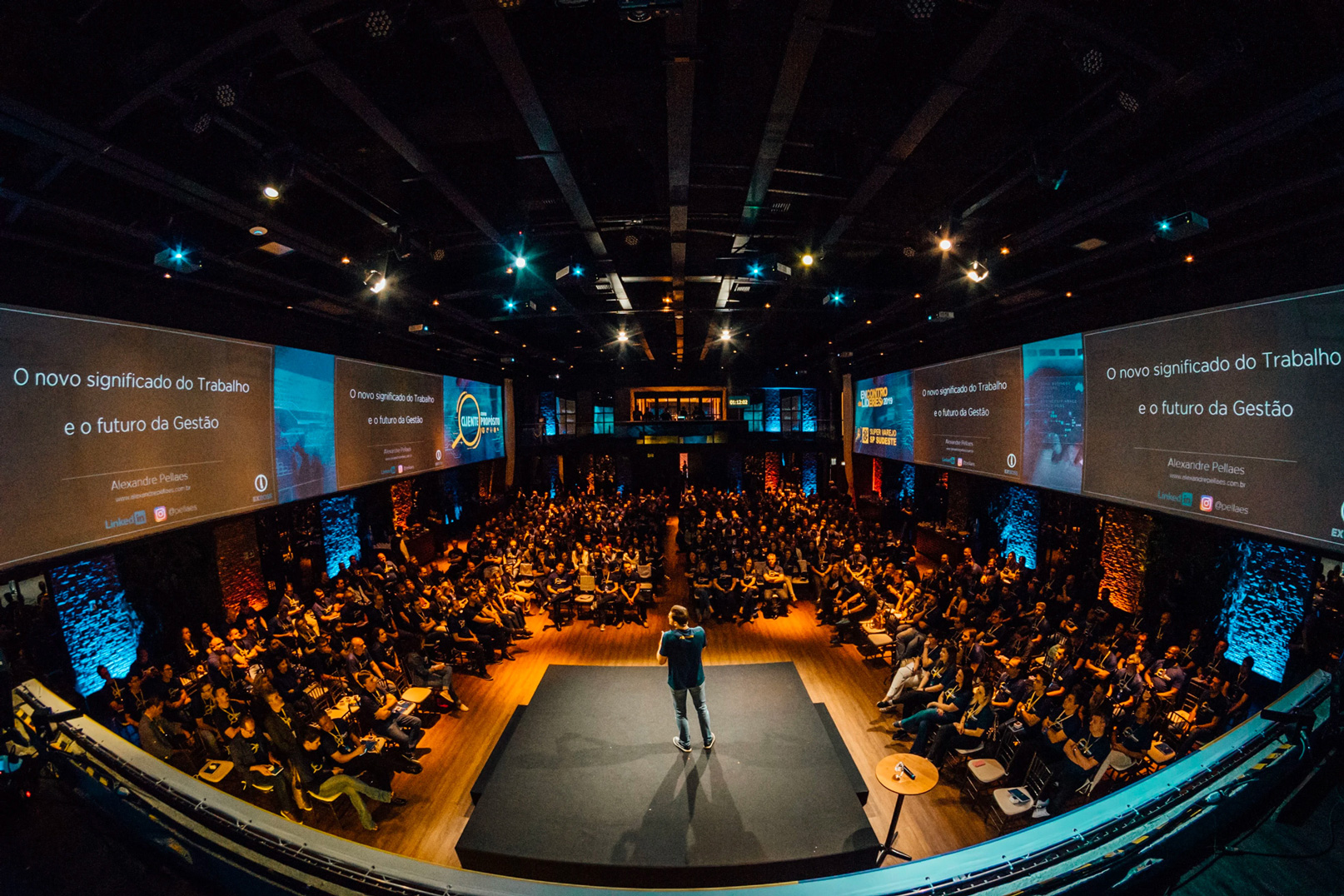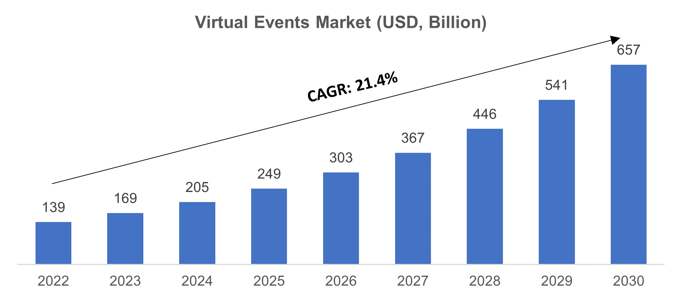Why Are Live Events Moving to a Hybrid Format?

The disruption in 2020 during Covid-19 has fundamentally altered the corporate landscape and virtual events have emerged as one of the great global success stories. Virtual events are becoming more than just a substitute for conventional live events; they’re bringing a fresh approach to expanding audience reach and boosting engagement. Such events are estimated to have 29% higher attendance rates and are easier to plan financially and in terms of time. Additionally, they grant easy access to KPIs like the total number of visitors, average visitor time, sessions viewed, and more.
Grand View Research estimates that the market for virtual events was worth US $114.2 billion in 2021 and is expected to grow at a CAGR of 21.4% from 2022 to 2030 to reach US $657.0 billion, depicted in the chart below.

The demand drivers for virtual events
Overall demand for virtual events is being driven by the increased acceptance by event professionals, rising investments by small and medium-sized businesses (SMBs), and technological advancement.
According to Bizzabo’s Event Outlook report, 93% of event professionals intend to invest in virtual events going forward. As a result, future virtual conferences and events will become much more advanced in terms of cybersecurity, virtual networking, and satisfaction.
Virtual event platforms have been widely adopted by SMBs for event marketing, access management, outsourcing and analytics, and social media development.
The increasing adoption of virtual event platforms, rising demand for VR and AR for businesses, and the increase in hybrid work-from-home models will also contribute to the expansion of the virtual event market.
How organizers are making virtual and hybrid events more interactive
Different technology and operational trends are emerging as companies seek to boost engagement, ROI, and seamlessness.
The technology trends include:
- Rising deployment of unified communications as a service (UCaaS): This cloud delivery model offers a variety of applications for communication and collaboration, such as enterprise messaging, telephony, and conferencing, and includes brands like Microsoft Teams and RingCentral. According to a Verified Market Research report, the UCaaS market was valued at US $17.57 billion in 2021 and is expected to reach US $35.75 billion by 2030. The adoption of UCaaS solutions, platforms, and services is particularly encouraged by the continued rollout of 5G data networks, cloud-specific network function virtualization (NFV), and multi-access edge computing (MEC) capabilities enabled by 5G technology for scalable and self-healing networks.
- Augmented reality (AR) and virtual reality (VR) gain traction: AR allows participants to experience computer-generated attractions like those featured in the groundbreaking Pokémon Go app and VR allows visitors to enter a 3D virtual world. Both spark curiosity and improve the interaction between eventgoers and brands. Today, virtual conferences, expos, and social events all feature this technology.
- Projection mapping: Projection mapping is a technique designed to fit any image or video onto a 2D or 3D surface (landscapes, buildings, stages, etc.) by using software to map the display virtually and then communicate it to the projector. Leading brands use projection mapping for custom event visuals and to enhance storytelling.
- Embracing artificial intelligence (AI): AI is now used by businesses to improve personalization efforts and gather real-time attendee data. Businesses can utilize this information to track consumer preferences, behaviors, and actions to better tailor their content.
The operational trends include:
- Gamification and interactive entertainment: Per a Markletic article, 59% of event organizers apply gamification strategies. Incentivizing attendee participation by adding games and other features to events can increase ROI, maximize learning, and boost engagement.
- Hyper-personalization is the norm: Event marketers will continue to focus on giving attendees a personalized experience. This will be especially evident in post-event follow-ups, as executive reports from the event can identify which users engaged with what content and enable content customization based on individual attendee interests.
- Virtual event monetization: In 2021, an estimated 9% of virtual events were paid affairs, and the average cost of virtual event tickets was only 20% of that of physical event tickets. However, the trend is reversing, and organizers are finding ways to monetize virtual events. The music industry seems to be advancing in this regard, with Spotify developing a virtual concert capability and eMusic partnering with 7digital to launch a virtual concert and monetization platform called eMusicLive.
Virtual concerts are proof the world is ready for other industries to do hybrid events.
When most music festivals and concerts were canceled during Covid-19, technology compensated. In fact, the biggest concert of 2020 took place inside a video game when Epic Games Inc. hosted a live event that attracted 27 million players to its video game, Fortnite. Several virtual concerts also happened in the metaverse during this time and featured some of the biggest names in music.
According to a Live Streaming Music report, 71% of performers and 68% of attendees concur that live streaming will play a big role in the future of the music industry. Leading promoter Live Nation said that it would outfit more than 60 of its physical music venues in the US with live streaming technology after purchasing live streaming platform company Veeps in 2021.
The fact that virtual music concerts became viable overnight and continue to be popular post-pandemic suggests that both technology and consumers are prepared for other types of virtual and hybrid events. Mike Schabel, CEO of the video technology startup Kiswe, says, “We are most excited about ‘hybrid events,’ where the audience isn’t just in-person, or just virtual, or just watching on TV, or just in a theatre, but all of the above and at the same time.”
Conclusion
The demand and investment in the digitalization of events will continue to rise driven by improved technology, operational optimization, and growing acceptance by consumers. More and more events will eventually move to a more hybrid format for greater attendance, lower event costs, increased engagement, and much more flexibility.



